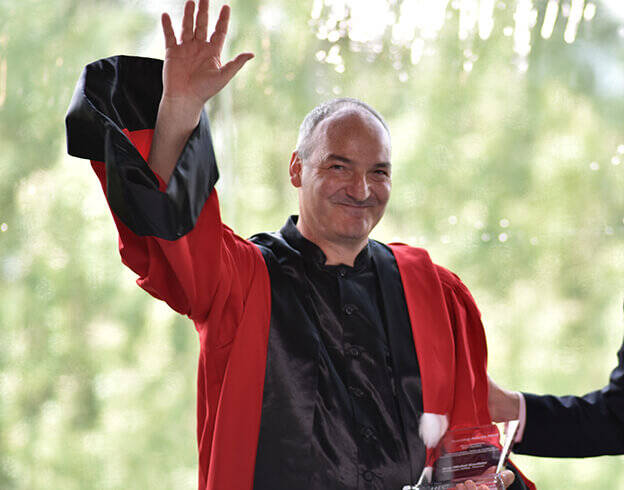Tribute to Denis Gromb, by the Finance Department of HEC Paris
Denis Gromb, Professor of Finance at HEC Paris, passed away on Sunday October the 30th. It’s impossible to overstate how wonderful it has been for us all, faculty, students, and staff, to work with Denis. The HEC Paris Finance Department conveys its deepest sympathy to Denis' wife and daughter, and to his family.

(© Ciprian Olteanu - Madetoshow.com)
The scientific community has many reasons to remember him. We feel that his direct academic contribution is best evidenced in two truly seminal papers.
As a visiting PHD student at LSE, Denis met Mike Burkart and Fausto Panunzi. Together, they wrote an important and influential paper, “Large shareholders, monitoring, and the value of the firm.” The paper uncovered a new and important tradeoff: Monitoring of managers by large shareholders can be a good thing to the extent that it reduces agency problems. There can be too much of a good thing, however, and when it becomes intrusive, large shareholders’ oversight stifles managers’ initiatives. So maybe it is a good idea not to concentrate ownership too much, to leave some discretion to the manager, and thus encourage initiative and involvement in projects.
At MIT, Denis overlapped with Dimitri Vayanos. Together they created an important new body of research, at the frontier between asset pricing and financial intermediation (starting with a seminal paper in 2002, “Equilibrium and welfare in markets with financially constrained arbitrageurs”). If markets are perfect and complete, then the law of one price holds and the equilibrium is Pareto optimal. While the assumption of perfect and complete markets makes the model nicely tractable, it is also extremely unrealistic. Denis and Dimitri managed the “tour de force” of relaxing that assumption, making the model much more realistic while still offering a tight characterization of equilibrium. If deviations from the law of one price arise, then arbitrageurs should step in and trade on them. Financial constraints such as collateral constraints or borrowing constraints, however, limit the extent to which they can do so, preventing immediate price adjustment. But, as arbitrageurs’ positions become more and more profitable, their financial constraints are relaxed, and they invest further, thus driving prices closer to the no-arbitrage case. By doing so, arbitrageurs not only foster price adjustment, they also provide liquidity. Thus, they create positive externalities. Because arbitrageurs do not fully internalize these externalities, however, equilibrium generally is not Pareto optimal. This creates the scope for policy intervention.
This stream of research illustrates a great strength of Denis’ research. His work addresses important issues that really matter for finance practitioners, but it does so within the rigorous and deep framework of equilibrium theory and keeping in mind welfare considerations. We need that type of research to understand the world and have something useful to say about it.
Denis’ papers illustrate his maestria as a researcher. He would identify an important open issue, craft the simplest and most elegant model possible, and thus shed crystal clear light on the problem. Reading Denis’ work is an amazing experience, and fortunately, this treasure is still with us. Even more amazing was observing Denis think. You would ask him a difficult economic question. He would pause. For several seconds or minutes, he would frown and maybe say “hum, hum.” Then, slowly, deliberately, Denis would develop a deep and subtle argument. After that, it would be your turn to pause and be silent, to take in the depth and subtlety of Denis’ thoughts.
Denis’ contribution to economics however goes far beyond his own papers. As a mentor, a teacher, a source of inspiration, an adviser, and a generous provider of comments and suggestions, he helped many, many of us come up with better papers and with better ideas. We owe him to try following in his footsteps and being as generous to others as he has been to us.